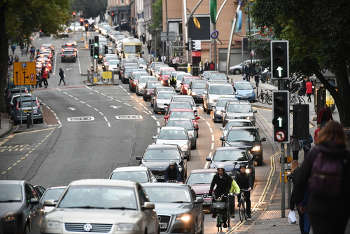Politicians and transport planners should treat air pollution as a public health priority and recognise the limitations of technological fixes, two leading academics have said.
Dr Tim Chatterton and Professor Graham Parkhurst from the University of the West of England said that despite considerable policy and action at various levels of government since the Environment Act 1995, ‘measurements in the real environment show little improvement has been achieved’.

Bristol, home of the University of the West of England
They argued that road traffic accidents remain the primary concern of transport planners although pollution contributes between 15 and 30 times the annual number of deaths.
The experts are due to present the findings from a synthesis of research conducted over several years at the Royal Geographical Society (with IBG) Annual International Conference on Wednesday (31 August).
Professor Parkhurst said: ‘Air pollution is perhaps the grossest manifestation of a general failure of UK transport planning to take the environmental impacts of transport choices sufficiently into account. Currently air pollution is a shared priority between Defra and DfT, but shared priority does not mean equal priority.
‘Environmental managers only identify and monitor the problems. Insufficient relevant priority has been given within the sector responsible for most relevant emissions – transport policy and planning – which has instead prioritised safety and economic growth.’
He added: ‘A local authority grant funding line is needed to tackle air quality problems through local transport policy measures, this would help ensure that poor air quality receives sufficient priority.’
At least 40,000 premature deaths a year in the UK can be attributed to air pollution, mainly from road transport.
The study also identified a strategic policy 'tone' which continues to provide for the private car as central to national transport policy, combined with limited regulatory and financial support for alternative modes of transport and for councils seeking to introduce measures such as low emissions zones.
Dr Chatterton said: ‘Air pollution-related morbidity and mortality are at epidemic levels and, although less obvious, are more significant than road transport collisions as a cause of death and injury. Politicians at local and national levels must treat poor air quality as a public health priority, placing clear emphasis on the severity of the problem and the limitations of technological fixes.
‘Existing approaches that focus on individual, voluntary, behaviour change and technological innovations are not sufficient to tackle poor air quality.’
A key recommendation from the review is the need for government to re-examine the relationship between environmental management and transport management at both the national and local levels.
Specifically, transport agencies, including local authorities, should be required to give higher priority to air quality management, which would involve resource investment, the experts said.
Other factors
Further factors identified by the review as 'frustrating attempts to reduce pollution from UK road transport' include:
- An over-reliance on policy measures to influence individual travel behaviour, whereas in practice transport choices emerge from individuals interacting with a wide range of social factors and are strongly conditioned by factors such as the nature of the built environment and the transport alternatives.
- Lack of political salience of the problem amongst the wider population
- Belief that technological improvement would make a big difference was misplaced and encouraged the adoption of diesel technology.Additionally, emissions control technologies have not performed as designed in the 'hostile' real-world road environment. It would take a major shift to zero emission vehicles to address this problem.
- Failure to recognise that, given the existing vehicle fleet is replaced only slowly, reduced vehicle use is the only sure way to bring about changes in measured concentrations. However, there is a corresponding lack of emphasis on 'push' behaviour change policies to encourage walking and cycling in particular. Instead, policies for behaviour change mostly rely on voluntary measures, which are as a result not very effective.
Register now for full access
Register just once to get unrestricted, real-time coverage of the issues and challenges facing UK transport and highways engineers.
Full website content includes the latest news, exclusive commentary from leading industry figures and detailed topical analysis of the highways, transportation, environment and place-shaping sectors.
Use the link below to register your details for full, free access.
Already a registered? Login